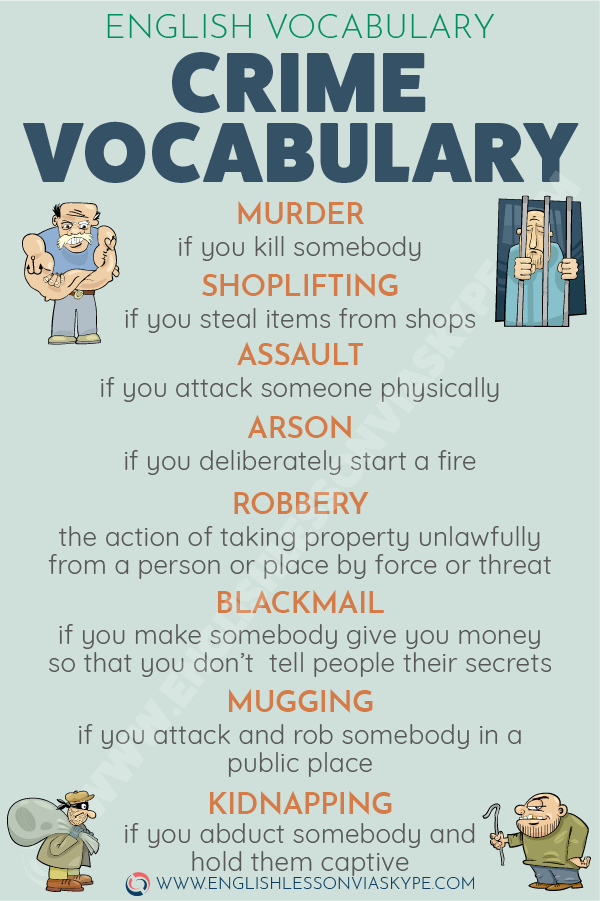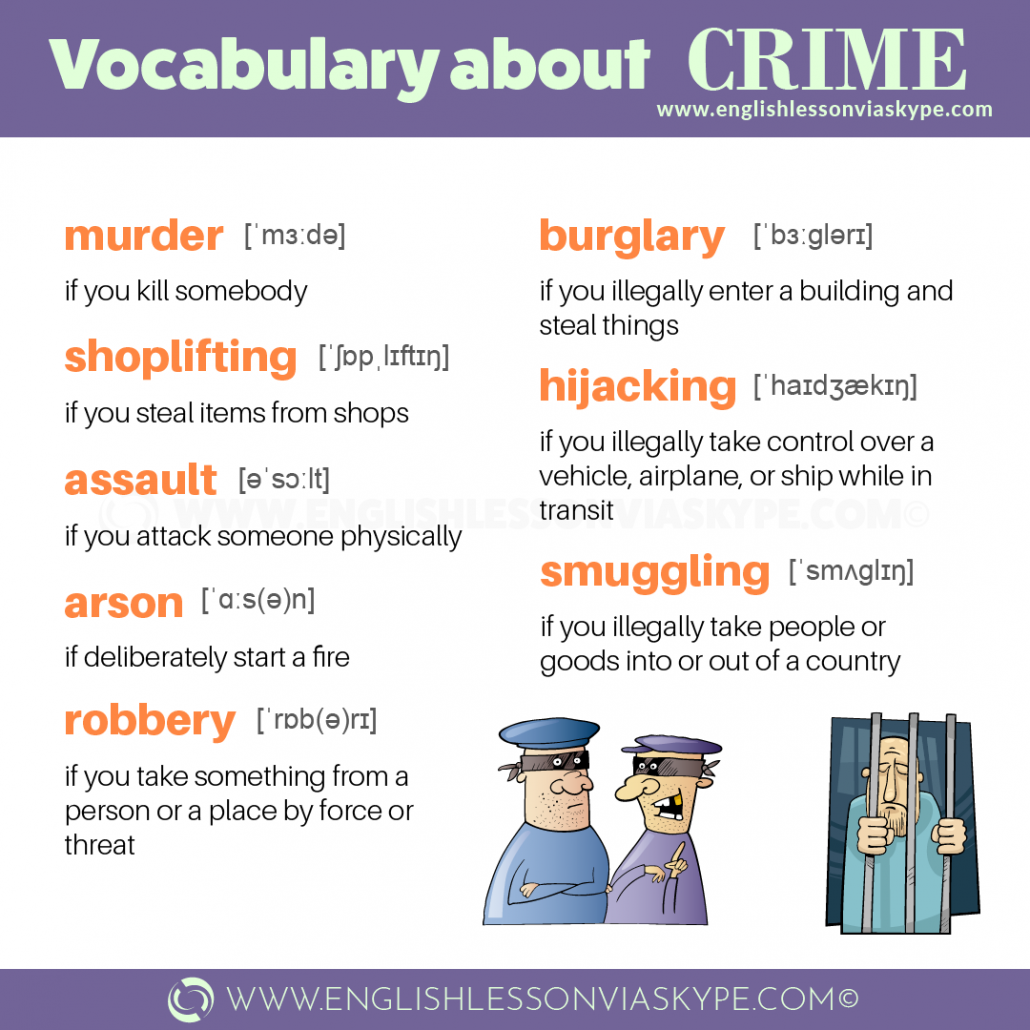Here you will learn important crime and punishment vocabulary words – arson, shoplifting, murder, manslaughter and many more.
Crime and Punishment Vocabulary Words

Harry
There is a well known book entitled “Crime and Punishment” written by the equally well known Russian author Dostoyevsky. There is also a BBC series of the same name. My post, however, is a little more mundane (common) where I take a look at English crime and punishment vocabulary words and phrases. By the end of this post you will be able to learn, recognise and use some of these useful English words and expressions related to crime and punishment.
Intermediate to Advanced English Marathon

INSANITY: doing the same thing over and over again and expecting different results.
Albert Einstein
- What you'll learn:
- better understanding of more complex grammar structures
- advanced English vocabulary words
- British & American slang
- perfect your listening skills through practing different accents
- This marathon is for you if you're:
- stuck at an intermediate English level
- tired of confusing explanations
- a mature student
- shy & introverted
Vocabulary related to Crime
ROBBERY
a robbery takes place when someone (a robber) enters a property that is not his/hers and takes something (cash, paintings, jewellery and other items).
A ROBBER (the person) usually breaks in (gains access illegally to a building, house office or apartment) and robs (the verb to rob) items as I have described.
Many centuries ago there were “highway Robbers” travelling across England on horseback where they would rob the stagecoach usually occupied by well off (wealthy) travellers.
A BREAK IN to our home or office is also referred to as BURGLARY and the BURGLAR is the criminal.
MUGGING
This is where an individual is attacked in the street and robbed of his possessions he is carrying. These usually consist of jewellery like rings and watches, cash, credit cards and mobile phones.
The MUGGER (person who commits the crime) may or may not use violence. The victim is then said to haven been MUGGED or robbed.
ASSAULT
This word is usually used to describe when a person is attacked in their home or work place or in the street by a person referred to as the ASSAILANT. The attack may be an unprovoked attack (not planned or carried out for a particular reason). The reason is not usually to take possessions but purely to inflict harm or injury on the VICTIM (the person assaulted).
SHOPLIFTING
Not seen as a really serious crime as people are seldom injured, shoplifting is when an individual deliberately takes something from a shop with out paying for the goods. This is typically food or clothing that is concealed (hidden) in a bag or a coat to avoid being detected (seen) by a security guard or shop assistant. The SHOPLIFTERS (those carrying out the crime) are often young adolescents (teenagers) but not always.
PICKPOCKETING
A well known crime which is highlighted in many old novels. This occurs when someone unknown to you casually (in a relaxed way) is able to steal (take with out your knowledge) a purse or wallet from your coat or pockets whilst standing beside or behind you. This often takesplace in a busy street where people are constantly bumping into each other. The PICKPOCKET (criminal) mixes with the crowd in shops and train stations trying to identify an unsuspecting (innocent) victim.
Crime and Punishment Vocabulary Words
Vocabulary Words related to Crime (continued)
MURDER
This is of course the most serious of all crimes. People are regrettably murdered every day.
Some people die accidentally in car accidents so they are KILLED not murdered.
When someone is murdered it is usually deliberate (intentional). For example, shot by an armed robber or attacked in the street. However, if someone dies from an attack but it was not intended to kill that person then the murderer/killer is likely to be charged with MANSLAUGHTER which is a lesser charge.
FRAUD
This has been a crime throughout the centuries and usually associated with money or valuable paintings or jewellery. The FRAUDSTER (criminal) attempts to get someone’s money or valuables. This in the case of a painting can be attempted by trying to replace the original painting with a copy (forgery).
Today, fraud is now a big issue because of internet crimes so people are trying to find ways to access our personal details and bank accounts on-line and rob us without having to physically break in to our homes or offices.
Other crimes include ARSON where someone deliberately sets fire to buildings or forests
and
BLACKMAIL where the criminal (BLACKMAILER) tries to get money for you in exchange for not divulging (releasing) very private information that may damage your reputation (personal photo’s or details perhaps of some affair).
So there are many ways to describe different types of crime as we have seen: Burglary, Robbery, Mugging, Shoplifting but the unfortunate person is usually only referred to as a victim. A VICTIM OF CRIME.
Crime and Punishment Vocabulary Words
Vocabulary Words related to Punishment
Once the criminal is apprehended (caught by the police) then the process is often a long one involving months or years before he/she is brought before the courts, put on trial (in front of a Judge and a Jury) and if/when found guilty sentenced (what prison term he /she will get) and sent to jail.
A JURY is a group of citizens (usually no more than 12 men and women) who are picked randomly and listen to the evidence presented and directed (helped by) by the judge, decide based on the evidence they hear whether the accused is guilty of the crime.
For lesser crimes like shoplifting and petty crimes (damage to public property) the OFFENDER (often youngsters) may get COMMUNITY SERVICE (working some hours in the community instead of a prison sentence). This could involve cleaning the streets or painting public property or helping deliver meals to the elderly.
Other criminals can be put on PROBATION (released from prison) for a period of months or years. They can live at home and will not go to prison provided they do not carry out any criminal activity for the probation period. In recent years some countries have introduced ELECTRONIC TAGGING (a tag like a watch or electronic gadget) of these type of criminals so the police can track (study) their movements and they may be restricted from leaving their home between 7 pm in the evening and 7 am in the morning.

Share and help other students to improve English skills
Useful sentences and phrases related to Crime and Punishment
He was accused of committing a crime. – believed to be a suspect responsible for a particular crime
He was charged with committing the crime. – when the evidence clearly shows he carried out the crime
He was sent forward for a trial or put on trial. – a date is set when he must appear before the Judge and Jury
He was found guilty. – the evidence presented to the Judge and Jury is accepted by the Jury as proof that he committed the crime
He is sentenced by the Judge or the Judge passes sentence. – the judge announces what the punishment will be
He will serve his time. – judge tells him how long and where he will be kept until released
He was acquitted of the charges. – found not guilty, insufficient evidence
He was released on probation. – after serving part of his sentence the prisoner is eligible for parole
The sentence for the crime is quashed (new evidence comes up) and following an appeal by his lawyers he is deemed (believed) not to have committed the crime and released immediately.
You've Got to Pick a Pocket or Two
“You’ve got to pick a pocket or two” song from the musical movie “Oliver!” (1968). The musical is based on the novel “Oliver Twist” by Charles Dickens.
Ron Moody acted as Fagin and won Golden Globe as the best actor (comedy/musical) for his role in this movie.
More Information
For more information in English Expressions, English Phrasal Verbs and English Grammar Rules, check ou the following links:
English Phrasal Verbs with AROUND
Intermediate English learners! Here is your chance to master English Grammar Tenses so you can speak English fluently and with confidence, sign up for 3 hour English Grammar Rules Refresher Course. Click on the link to read more.
Once you are comfortable with using Crime and Punishment Vocabulary, have a look at police vocabulary.
You will love these English lessons

Intermediate English Holiday Vocabulary
Here you will learn useful English holiday vocabulary words and expressions. Holidays are great when everything goes according to plan. However,


Phrasal Verbs Related To Decisions
Here you will learn English phrasal verbs related to decisions and decision making. Follow clear and detailed explanations in my


Learn Advanced Vocabulary With The News
Learn advanced vocabulary with the news. This lesson will help you in learning English vocabulary in context. You will learn